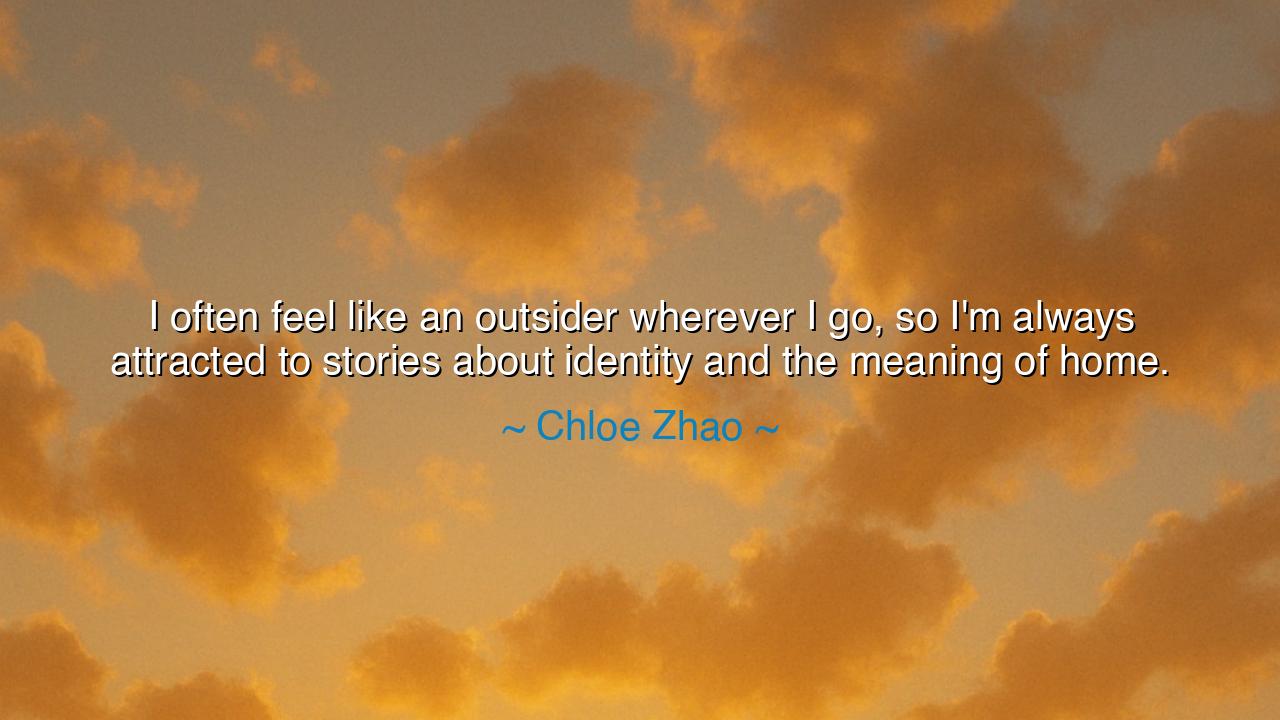
I often feel like an outsider wherever I go, so I'm always
I often feel like an outsider wherever I go, so I'm always attracted to stories about identity and the meaning of home.






The filmmaker Chloé Zhao once said, “I often feel like an outsider wherever I go, so I'm always attracted to stories about identity and the meaning of home.”
In these quiet and poignant words lies a truth that touches the hearts of wanderers and dreamers across all ages — that the search for belonging is one of the oldest and deepest of human quests. To feel like an outsider is to stand between worlds, to see both the beauty and the loneliness of existence. It is a feeling both tender and fierce — a wound that never quite heals, yet a gift that grants sight others cannot see. Zhao, whose art captures the silences of life, speaks from the soul of one who has traveled far from the familiar, seeking not a place, but an understanding of self.
The origin of this quote arises from Zhao’s own journey — born in Beijing, educated in England and America, and now a storyteller of the open plains and broken dreams of others. In her films, such as Nomadland and The Rider, we see this truth unfold like a quiet prayer: that home is not always where we are born, but where we are truly seen. Through her characters, who drift through the deserts and highways of modern America, Zhao explores what it means to exist without roots, to build belonging out of moments instead of geography. Like the ancients who wandered through deserts in search of promised lands, she teaches that sometimes the journey itself becomes the home we seek.
This sense of exile, of being between worlds, is as old as human history. In every age, the artist, the philosopher, the pilgrim — all have known what it means to walk through life as strangers. The Greek hero Odysseus spent years upon the seas, searching for Ithaca, yet even when he returned, he found that time and experience had changed him beyond recognition. His home remained, but he was no longer the same man. So too does Zhao’s reflection remind us that the journey changes us — and that sometimes, the home we yearn for is not a place to return to, but a peace to find within.
To be an outsider, though painful, is also to see more deeply. Those who live between cultures, languages, and worlds carry within them the vision of both the insider and the observer. They learn compassion because they understand alienation; they learn creativity because they must invent meaning for themselves. In Zhao’s words lies not sorrow, but a quiet acceptance: she does not lament her estrangement — she transforms it into art. The outsider becomes the mirror for humanity, reminding all who feel lost that even displacement has purpose. For those who are never fully at home in one place, every landscape becomes sacred, every encounter a revelation.
Consider the poet Rumi, born in one land, exiled to another, whose words would later transcend all boundaries of faith and nation. He wrote, “Wherever you stand, be the soul of that place.” This was the wisdom of one who knew the pain of dislocation, yet turned it into a bridge between worlds. Like Zhao, he saw that home is not merely soil or structure, but a way of being — a living harmony between one’s heart and one’s surroundings. In this sense, those who feel out of place may be the ones most attuned to the universal home that lies beneath all difference.
In Zhao’s art, the search for identity is never complete, for identity itself is fluid — it changes as we move, as we love, as we lose. But that fluidity is not weakness; it is grace. The rivers do not lament their lack of permanence; they find beauty in their flow. To feel like an outsider, then, is not to be rootless, but to have roots everywhere — in the kindness of strangers, in the vastness of sky, in the stories we share. When she says she is “attracted to stories about identity and home,” she is not seeking final answers, but honoring the sacred act of searching.
So, my child of many paths, learn from Chloé Zhao’s wisdom: do not fear being an outsider. The world belongs to those who wander, to those who ask who they are and where they belong. If you cannot find home in one place, build it in your heart. Create it in your art, your compassion, your connection to others. The feeling of not belonging is not a curse, but an awakening — a reminder that home is not a fixed point on the map, but the state of a soul at peace with its journey.
And remember this: every being who walks this earth is, in some way, seeking their home. The wanderer, the exile, the dreamer — all are pilgrims upon the road of identity. To feel like an outsider is to live close to truth, for it means you are awake to the mystery of existence. As Chloé Zhao teaches, let your longing guide you, let your curiosity be your compass, and let your heart, wherever it travels, be the home you carry with you always.






AAdministratorAdministrator
Welcome, honored guests. Please leave a comment, we will respond soon